Traian Hristea: EU Member States will gradually lift restrictions on non-essential travel from third-countries
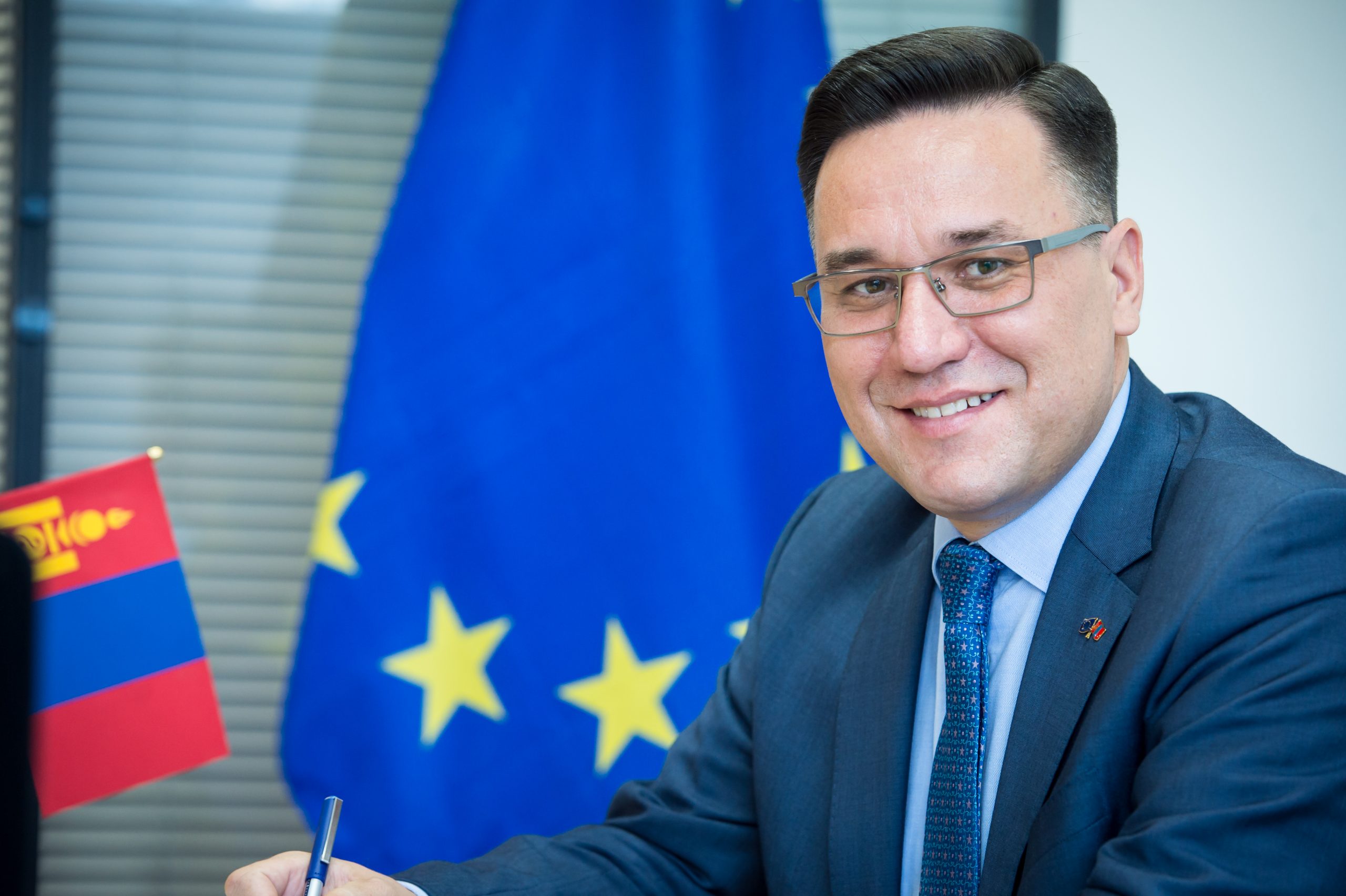
Mongolian Economy magazine spoke with Traian Hristea, the EU Ambassador and Head of Delegation to Mongolia, about key projects implemented by the EU Delegation, EU-Mongolia relations and EU travel restrictions.
-Could you introduce yourself to our readers?
-Thank you for inviting me. My name is Traian Hristea. I have been working as the European Union (EU) Ambassador and Head of Delegation to Mongolia since 2017.
Previously, I worked as an EU Ambassador to Romania and Kazakhstan. That means I held EU Ambassador’s positions three times in a row. Before joining the EU, I worked as the Head of Policy Planning Department at the Ministry of Foreign Affairs of Romania. Also, I worked as the Extraordinary and Plenipotentiary Ambassador of Romania to Ukraine.
-How would you describe your working experience at the Delegation of the EU to Mongolia?
-I am happy to be able to contribute to deepening the EU and Mongolia relations. It is a great privilege to come back to Mongolia as the first resident Ambassador of the European Union. In fact, between 1990 and 1995, I studied at the National University of Mongolia to get my degree in Mongolian studies.
-The EU established a permanent Delegation to Mongolia only in 2017. Why did the EU not have a Delegation until then?
-Before 2017, the EU had an office that handled matters related to Mongolia. It was called the Technical office for promoting coordination of different projects that have been implemented in Mongolia. Some of the projects were coordinated from the EU Delegation in Beijing which was responsible for both China and Mongolia.
For the EU, Mongolia is an important partner and we have been supporting the country’s transition over the last three decades. The decision to have a permanent delegation in Mongolia was made during the Asia–Europe Meeting Summit. The High-Representative of the Union for Foreign Affairs and Security Policy and Vice-president of the European Commission Federica Mogherini, the President of the Commission Jean-Claude Juncker and the President of the Council Donald Tusk who were participating in the summit decided to open a permanent delegation in Mongolia. I guess it was necessary to open a delegation to address the request from Mongolian authorities to have a permanent diplomatic representation and presence in the country. The Mongolian authorities were happy to have EU representation in Ulaanbaatar, not in another country.
In the beginning, we were hosted by our Italian colleagues. We had the official opening of the temporary premises of the EU Delegation when Commissioner Neven Mimica who is in charge of international cooperation and development paid an official visit to Mongolia in November. Thereby, since April last year, we started to add new team members to EU Delegation in Mongolia.
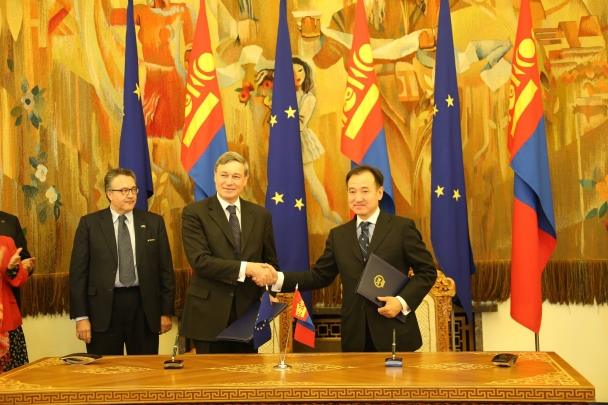
Signing the Establishment Agreement to open the Delegation of the European Union in Mongolia
-The Multi Indicative Programme 2014-2020 was focused on improving the governance of revenues for inclusive and sustainable growth. What constitutes inclusive and sustainable growth?
-Sustainable growth is about building a resource-efficient, diversified, sustainable and competitive economy to increase the country’s resilience. Inclusive growth means empowering people through better employment opportunities, training and poverty reduction. It also includes modernizing labour markets, training and social protection systems to help people anticipate, manage and adapt to changes, and also to build a cohesive society.
The agenda of sustainable and inclusive growth encompasses the improvement in policies and regulations in a number of areas related to environmental protection, rural development, fiscal arrangements and spending policies. It aims to provide broad-based support to build capacity in the Government administration, both at the central and sub-national levels, underpinning more adequate policies and regulation towards inclusive and sustainable development. The focus remained on supporting the improvement of public financial management so the Government could better manage revenues generated particularly from the mining sector.
Better governance of revenues from extractive industries can have a positive impact on social policies. It can also contribute to promoting a sound and predictable business environment, improving the investment environment and fighting corruption. Furthermore, improving environmental governance can reduce the negative impact of mining industries on the environment.
-What has been done in terms of improving governance of revenues for inclusive and sustainable growth?
-Since 2018 we have been working closely with the World Bank to support the efforts of the Government of Mongolia in improving fiscal discipline and ensuring transparency and accountability of the public finances. Due to the pandemic, we reallocated funds from the project to complement the Government of Mongolia’s efforts in assessing the potential impact of the pandemic on the economy, planning and monitoring fiscal resources, resource allocation and expenditure on COVID-19 response.
Last year we signed the EU’s first-ever budget support programme worth EUR 50.8 million with the Ministry of Finance. Budget support is dedicated to the Government’s reform agenda which includes Employment Policy and its Public Finance Management Reforms. It is expected to help to improve employability, to promote decent work and formal employment, to mobilise domestic resources, increase spending effectiveness and strengthen state and non-state actors’ ability to oversee Public Finance Management. The disbursement of funds depends on the progress of seven performance indicators that we have agreed on with the Ministry of Finance and Ministry of Labour and Social Protection. For instance, two indicators are tied to the progress on domestic revenue mobilisation.
-What type of support has been provided in terms of diversification of Mongolia’s economy?
-First of all, I would like to mention that we have been supporting economic diversification through a variety of programmes and projects offered by the EU. In the past seven years, we have mobilised more than EUR 140 million in grants for Mongolia and have leveraged EUR 200 million in loans from European development banks.
Since 2015, we have been working with the European Bank for Reconstruction and Development to support the Mongolian economic diversification by improving SMEs’ access to financing:
(i) through loans to Participating Financial Institutions for on-lending to SMEs;
(ii) through risk-sharing with PFIs on their loans to SMEs, and
(iii) by providing direct financing to SMEs (including long-term capital investment loans, equity and quasi-equity investments).
In terms of concrete actions aimed at diversifying the economy, the EU has been providing Trade Related Assistance to Mongolia (TRAM) with a focus on trade policy, trade facilitation and export development since 2017. The achievements of the project have been instrumental in further facilitating economic diversification. For example, as a GSP+ country, Mongolia is benefitting from the implementation of the EU’s Registered Exporter System from January 2020. It is a system of certification of the origin of goods based on a principle of self-certification. Moreover, the TRAM project has also supported the drafting of the Mongolian Export Program and the Regulation on Safeguard and the Regulation on antidumping and countervailing.
Under the TRAM project, we selected jointly with all stakeholders four non-mining sectors that have the potential of exporting value-added, high-quality and environmentally sustainable products. Such products are cosmetics made with animal-derived ingredients; sea buckthorn oil; textiles from yak and baby camel hair; and yak leather products. Within that framework, we facilitated the establishment of export clusters in these four sectors comprising about 100 exporting enterprises, public bodies and scientific/research institutions.
Furthermore, we have supported the Ministry of Foreign Affairs and the Mongolian National Chamber of Commerce and Industry in setting up the European Investment and Trade Promotion Center of Mongolia in Berlin, Germany. The centre serves as a showroom and sales outlet for premium products especially from the supported export clusters and as an information hub for European investors and businesses.
-What activities have been undertaken to support better employment opportunities under the Multi Indicative Programme 2014-2020?
-The EU funded the “Support to the Technical Vocational Sector” (STVET) project that provides assistance in the policy development and implementation of the key TVET sector areas. The STVET project successfully assisted the Ministry of Labour and Social Protection in addressing key areas such as the financing mechanism for the TVET providers, the National Qualifications system, the accreditation and the quality assurance of the system. During the spring session, the law amendments inclusive of these important developments have been introduced to the Parliament of Mongolia.
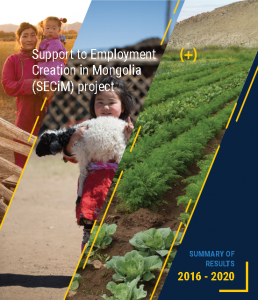 In addition, the EU funded a project called “Support to Employment creation in Mongolia”. This project is focused on supporting inclusive and sustainable development in Mongolia through the promotion of quality employment focusing on the non-mining sector. The SECIM 1 project provided assistance to the Government of Mongolia in the development of a conducive policy environment for promoting job creation, particularly for the most vulnerable, improving the functioning of the labour market and enhancing quality employment. The project also supported the elaboration of the National Employment Policy and legislative framework as well as its implementation, assisting in building capacity in the ministries, and relevant agencies.
In addition, the EU funded a project called “Support to Employment creation in Mongolia”. This project is focused on supporting inclusive and sustainable development in Mongolia through the promotion of quality employment focusing on the non-mining sector. The SECIM 1 project provided assistance to the Government of Mongolia in the development of a conducive policy environment for promoting job creation, particularly for the most vulnerable, improving the functioning of the labour market and enhancing quality employment. The project also supported the elaboration of the National Employment Policy and legislative framework as well as its implementation, assisting in building capacity in the ministries, and relevant agencies.
The SECIM 2 project focused on enabling job creation in the private sector through strengthening the value chain with a focus on light industries in agriculture and rural development: livestock and vegetables sectors. The aim was to effectively connect production with markets.
Moreover, the SMEs programme implemented with EBRD provided financing worth EUR 79.2 million to local SMEs. To illustrate, more than 245 SMEs in the non-mining sectors have received support to enhance their organisational management, marketing and sales, production enhancement, cost reduction and improvement of financial reporting. The SMEs that had benefited from such support have created approximately 2,256 new jobs in the non-mining sector.
-In 2014, Mongolia became a beneficiary of the Generalised System of Preferences (GSP+) allowing for virtually tariff-free entry into the EU markets. Do you think that Mongolia is effectively utilizing the GSP+? What needs to be done to fully bear the fruits of the GSP+?
-Currently, there are nine GSP+ beneficiaries: Armenia, Bolivia, Cape Verde, Kyrgyzstan, Pakistan, the Philippines, Sri Lanka, Mongolia and Uzbekistan. As a matter of fact, countries still can apply to become beneficiaries of GSP+. The preferential treatment is granted to countries that have ratified and respect 27 international conventions on human rights, labour rights, environmental protection and good governance.
Currently, 93 percent of total EU imports from Mongolia under GSP+ are concentrated on articles of apparel and textiles. Mongolia’s utilisation rate GSP+ scheme stands at around 84 percent which means there is still some room for improvement.
As mentioned previously, to further improve the utilisation of GSP+, we are implementing the TRAM project. If we can work together we can turn Mongolia’s huge potential into reality.
-Is there any possibility of expanding the scope of GSP+ to other agricultural or mining products?
-The list of products eligible for GSP+ includes mining products but it has been the long-term efforts of the EU to help Mongolia to diversify its economy and support employment, development and production in non-mining sectors. As you may know, the products exported to the EU have to meet certain high standards, expectations and criteria. I hope that through the continued engagement and dialogue with the Government of Mongolia, the EU could contribute to improving the quality and elevate the competitiveness of Mongolian products in the global market.
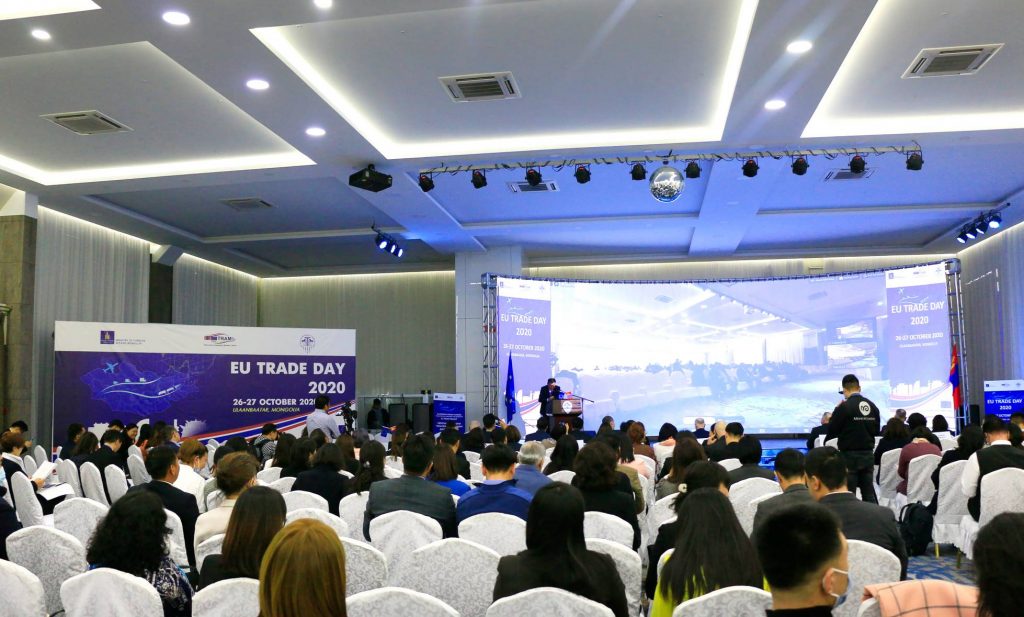
-According to the EU Delegation, Mongolia is eligible to participate in numerous EU programmes in higher education and research. Could you give examples of such programmes available for Mongolian citizens and higher education institutions?
-Mongolian citizens and higher education institutions are eligible to apply and benefit from the EU Erasmus+ programme. This programme provides opportunities for individuals to receive generous scholarships to study in European Universities. It also provides higher education institutions of Mongolia with an opportunity to apply for grant programmes to build the capacity of higher education institutions by facilitating cooperation and collaboration with European Universities.
Horizon Europe, previously known as Horizon 2020, is the biggest EU Research and Innovation programme. Under Horizon Europe Mongolian researchers can team up with European partners to participate in collaborative research projects or to benefit from researcher mobility and fellowship programmes. Combining the strengths, technologies and skills of the EU with those of Mongolia can contribute to finding innovative solutions for mutual benefit.
-Erasmus+ was the EU programme for education, training, youth and sport offered between 2014-2020. Will the EU offer similar programmes since Erasmus+ has ended in 2020?
-On 18 May 2021, the EU adopted the Erasmus+ programme for 2021-2027. The new Erasmus+ will offer more tools and resources to support inclusion. It will be simpler and more manageable for applicants, with more user-friendly IT systems and less paperwork. The programme will also measure its contribution to achieving the EU’s climate spending targets and reduce its own environmental footprint, for example by incentivising climate-friendly means of transportation for participants.
-The EU provided financial support to the platform for finding opportunities for volunteering under the “All for YOUth, YOUth for all” project. Also, the EU provides funding to the Youth Sustainability Corps run by Mongol Ecology Center. How does the EU Delegation select the projects and organization for its fundings?
-The grants are awarded through a competitive selection process. The EU Delegation to Mongolia called for proposals under the programme Civil Society Organizations and Local Authorities in 2019 and we received 13 proposals from international and national NGOs. Based on the EU selection process, we awarded the Caritas Czech Republic and Mongol Ecology Center with grants for their projects.
-How can any organization receive financial support from the EU Delegation? Do you call for proposals or organizations can send their request for financial support at any time?
-The European Union has different modalities and instruments in place that Mongolia is benefitting from, such as budget support, blending, thematic and regional programmes. With regard to the regional programmes, we call for proposals once every two years under European Instrument for Democracy and Human Rights and Civil Society Organizations and Local Authorities programme. Calls for proposals are openly advertised through social media channels. If you are subscribed to our Facebook and Twitter account you will receive information about calls for proposals.
The above-mentioned calls for proposals are country-specific, which means four to five projects will be selected from Mongolia. There are also regional calls for proposals such as the SWITCH Asia programme focusing on sustainable consumption and production practices in the region. In this call, Mongolian applicants are competing with applicants from other eligible countries in Asia, and so far Mongolia has been benefitting extensively from this programme.
-Under the “Budget Support for employment reform in Mongolia” the Government of Mongolia received EUR 16 million (MNT 53 billion) in October 2020 as the first disbursement of the Budget Support. How was the budget support spent?
-The Budget Support programme is the main development financing mechanism that the EU implements across the globe. This programme directly supports our partner countries with transfers to the government’s treasury accounts as additional funds to the state budget. This budget support programme is the first in Mongolia and its objective is to support the Government in its reform process for the Employment sector as well as further strengthening Public Finance Management. We are confident in our policy dialogue with the Ministry of Finance and the Ministry of Labour and Social Protection that the reform will keep progressing. We endorsed the Ministries’ efforts for progress on the reform which continued even during the pandemic.
-How did the COVID-19 pandemic affect the EU-Mongolia relations?
-The COVID-19 crisis has affected many countries including the EU and its Member States. We have experienced the devastating effects on the public health sectors, on society and on businesses. We understand the difficulties and responsibilities that come with managing such a crisis. That is why I would like to endorse the continuous efforts from the Government of Mongolia, the Ministry of Health and other authorities. These efforts have been critical in mitigating the effects of the COVID-19 crisis in Mongolia.
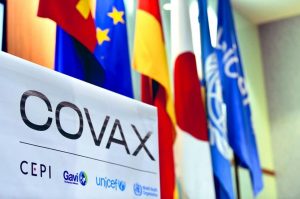 From the beginning of the COVID-19 outbreak, the EU has been very active in supporting global efforts to fight the pandemic. For instance, the EU has been increasing its financial support to partner countries, allocating additional funds for emergency supplies and investing in research. Team Europe has mobilised more than EUR 38.5 billion to end the spread of the virus and to avoid spillover effects on economic and social stability and security in its partner countries around the world. In addition to that Team Europe is one of the leading contributors to the COVAX facility with over EUR 3.2 billion to help secure 1.3 billion doses of vaccines for 92 low and middle-income countries, including Mongolia, by the end of 2021. So far, Mongolia has received 14,400 AstraZeneca vaccines and 126,360 Pfizer vaccines from the COVAX facility.
From the beginning of the COVID-19 outbreak, the EU has been very active in supporting global efforts to fight the pandemic. For instance, the EU has been increasing its financial support to partner countries, allocating additional funds for emergency supplies and investing in research. Team Europe has mobilised more than EUR 38.5 billion to end the spread of the virus and to avoid spillover effects on economic and social stability and security in its partner countries around the world. In addition to that Team Europe is one of the leading contributors to the COVAX facility with over EUR 3.2 billion to help secure 1.3 billion doses of vaccines for 92 low and middle-income countries, including Mongolia, by the end of 2021. So far, Mongolia has received 14,400 AstraZeneca vaccines and 126,360 Pfizer vaccines from the COVAX facility.
The EU Delegation held a round of meetings with international and local stakeholders in Mongolia to discuss and assess emerging needs of the health sector as well as economic consequences. It is still in progress, but the total amount of the Team Europe response in Mongolia has reached around EUR 40.45 million (MNT 141 billion), working on three main lines of response:
(i) Tackling immediate needs for prevention, protection, medical care and crisis response, and strengthening the health system;
(ii) Addressing public finance management, employment, and SMEs challenges.
(iii) Addressing the needs of the most vulnerable population and mitigating the socio-economic impact of COVID-19.
The EU and Mongolia hold an annual dialogue that focuses on our mutual cooperation, human rights, economic development and political cooperation. I am very pleased to note that the pandemic did not stop us from continuing our dialogue with the Ministry of Foreign Affairs. This proves the friendship and extent of cooperation between the EU and Mongolia.
-What has been done within the framework of the “Mongolia COVID-19 Crisis Response” project funded by the EU and WHO?
-Since the COVID-19 outbreak, the EU focused on short and long term support to the Government of Mongolia by shifting our focus on certain programs. We managed to bring new funds to address the short term needs. We collaborated with the WHO on a EUR one million project to support healthcare in its response to the COVID-19 crisis. This project focuses on strengthening the capacity of the national health system to monitor, prevent and control the spread and effects of COVID-19. The activities include improving the quality of laboratories’ services, accessibility and the quality of essential health care logistics and services. We have provided the necessary equipment to ensure that the healthcare system and its infrastructure (hospitals, protocols) is capable of managing the COVID-19 and similar pandemics in the future. In this difficult and changing environment, we strive to ensure the communication between health workers and other target populations on hygiene, use of personal protective equipment, use of PCR test kits, and increased availability of essential medical supplies, equipment and expertise for COVID-19 response.
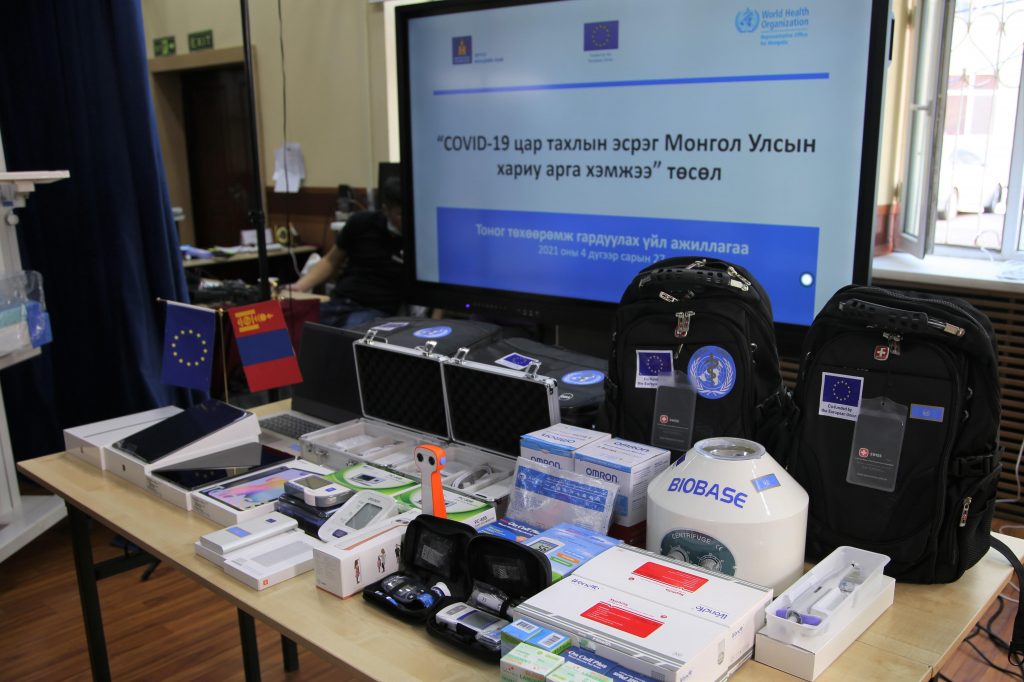
-What needs to be done to take the EU-Mongolia relations to the next level?
-The institutional basis of our bilateral relations is very strong thanks to the foundation of the principles of democracy, human rights and the rule of law. The EU and Mongolia adhere to the Partnership and Cooperation Agreement. The EU and Mongolia annually exchange views on human rights, development cooperation, trade and political issues. These annual discussions are excellent opportunities to define paths to make the principles that exist already on paper into reality through specific actions.
The EU businesses are renowned for their technology and know-how that not only bringing investments but also boosting the development of other economic sectors other than mining and creating new jobs in Mongolia. On that front, I would like to see an increased engagement with the Government of Mongolia on investment, supporting the access of European companies and investors to the Mongolian market. To attract foreign investors Mongolia needs to ensure regulatory stability, rule of law, contract enforcement and judicial independence.
-Could you share information about upcoming events or programmes with our readers?
-We are currently benefiting from good momentum as we are undertaking our programming exercise to develop the next Multi-Annual Indicative Programme for 2021-2027. With the EU Member States and following rounds of consultations with local, international and European authorities and partners, we have identified three priority areas where our work will be focused. The three areas are (i) green sustainable development, (ii) democratic and economic development and (iii) green energy transition. The Team Europe, EU Member States, European financial institutions and other European partners will also work on sustainable natural resource management and value chain development in Mongolia.
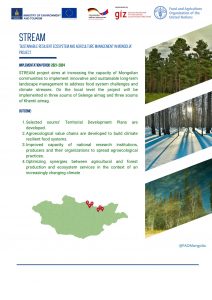 Last month we launched a pilot Team Europe project, the Sustainable, Resilient Ecosystem and Agriculture Management, the so-called STREAM project. With the support and expertise from three EU Member States, Germany, Czech Republic and France and with our international partner FAO, we will work with the Government of Mongolia in fostering innovation through climate-related practices in sustainable agriculture and landscape management of forest resources.
Last month we launched a pilot Team Europe project, the Sustainable, Resilient Ecosystem and Agriculture Management, the so-called STREAM project. With the support and expertise from three EU Member States, Germany, Czech Republic and France and with our international partner FAO, we will work with the Government of Mongolia in fostering innovation through climate-related practices in sustainable agriculture and landscape management of forest resources.
In June, we plan to officially launch our new Roadmap for the EU’s engagement with civil society in Mongolia for 2021-2025. Also, with the EU Member States, we will be developing the country-level implementation plan to implement the EU Gender Action Plan III for gender equality and women’s and girls’ empowerment.
While the pandemic keeps throwing curveballs, we are committed to engaging with the public through universal means of communication such as art, music and culture. You might know that we have held an online concert to celebrate EU day in Mongolia. It is still available on our youtube channel. I must say that I was amazed by the talent of the Mongolian youth and I am particularly grateful to the Mongolian musicians who performed musical pieces from European classical composers. It was a real pleasure and I hope that the concert will reach the hearts of many more citizens. Last year we held the first EU film festival in Mongolia. We intend to hold a film festival again this autumn.
-What are the common obstacles in implementing any projects and programmes by the EU and its Member States in Mongolia?
-First of all, I would like to say that we come across a lot of opportunities while implementing projects and programmes in Mongolia, and we have been grateful to have developed good relations with the Government, local authorities, civil society, private sector and development partners. However, there are some common obstacles that we tend to face during project implementation.
Mongolia has different regulatory, policy and institutional frameworks for different sectors. Thus, the implementation of such frameworks and alignment with international conventions can be seen as challenging. Mongolia has adopted an ambitious development policy and has increased its National Determined Contributions targets, as well as committed to meeting the Sustainable Development Goals. A strengthened regulatory, policy and institutional framework and its effective implementation are key to supporting Mongolia in achieving all targets and development ambitions.
There is a need for market liberalisation, improved market access, elimination of technical and other barriers to trade. I commend Mongolia on its open trade and investment regime including its policy orientation toward more inclusive trade. Mongolia had impressive economic growth until early 2020. The impact of COVID-19 has severely affected its economy, albeit with Government intervention which was mainly in the form of stimulus packages, the economy is projected to accelerate and recover soon. Despite these positive trends, Mongolia’s economy remains heavily reliant on a few sectors. The trade is concentrated on limited products and markets, thus there is a strong need for economic diversification.
Having said that, the EU is keen on supporting the Government’s efforts to establish a sustainable trade policy in line with WTO and multilateral agreements. However, there are still some obstacles to effective trade with the EU market: unequal level-playing field and unfavourable investment environment coupled with a gloomy economic outlook that hinders access to the local market. Other than the mining sector, agriculture, livestock, garment and cosmetics industry and renewable energy sectors can certainly provide opportunities for economic diversification. In order to make Mongolia more resilient to external shocks, economic diversification and investments will be critical.
Some investors tend to face important challenges and they point out the need for regulatory stability, clear perspective on maintaining the already signed agreements, predictable “rules of the game” and independence of the judiciary, to increase the trust of investors.
-Do you have any information about permitting vaccinated third-country citizens to enter EU territory for non-essential purposes?
-On May 20 2021, the Council updated the travel recommendation to the EU. The Council adopted a recommendation on the temporary restriction on non-essential travel into the EU. This amendment responds to the ongoing vaccination campaigns by introducing certain waivers for vaccinated persons and easing the criteria to lift restrictions for third countries.
For restrictions on non-essential travel to be lifted for a given third country. Under the new rules, the number of COVID-19 cases per 100 000 inhabitants over the last 14 days has been raised from 25 to 75. The progress in having the population vaccinated against the virus should also be taken into account.
-The Council of the EU added Israel to the list of countries for which member states should gradually lift restrictions on non-essential travel. In Mongolia, More than 80 percent of all residents over 18 have gotten at least the first dose of the COVID-19 vaccine. Do you think Mongolia will or could be added to the list?
-If member states accept proof of vaccination to waive travel restrictions such as testing or quarantine, they should in principle lift restrictions on non-essential travel for third-country travellers who have received the last recommended dose of the EMA (European Medicines Agency) approved vaccine (which includes vaccines from Moderna, Pfizer, AstraZeneca and Johnson & Johnson) at least 14 days before arrival.
Moreover, Member States could also lift the restriction on non-essential travel to those who have received at least 14 days before the last recommended dose of a vaccine having completed the WHO emergency use listing process. In lifting these restrictions, EU Member States should take into account reciprocity on a case by case basis.
-Where can Mongolian companies receive assistance and financial support to enter the EU market?
-Our SMEs project with EBRD as I mentioned earlier, is supporting SMEs with access to finance and know-how, to strengthen their economic operations not only in Mongolia but also abroad. With our upcoming EU seven-year programme we will continue providing trade-related assistance to Mongolia, as well as focus on strengthening the export potential and sustainability of agriculture and forestry value chains.
The European-Mongolian Chamber of Commerce EuroChamber brings businesses together. Although it cannot provide financial support, it is a platform for exchange on issues that are common to many businesses and hinder market access. You can find more information about EU investors and companies from the Chamber.
